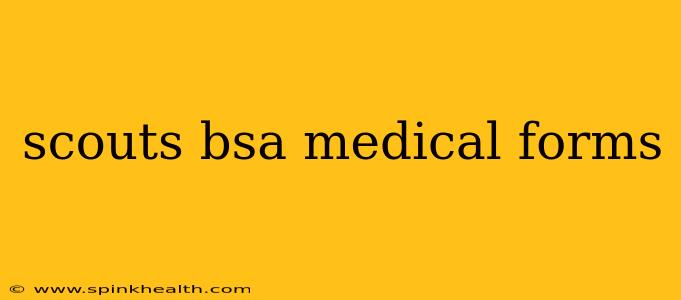The crisp scent of pine needles, the crackle of a campfire, the thrill of conquering a challenging hike – these are the hallmarks of a Boy Scouts of America (BSA) adventure. But before embarking on any journey, especially one involving the outdoors, ensuring the safety and well-being of every Scout is paramount. This involves understanding and properly completing the necessary BSA medical forms. This isn't just about ticking boxes; it's about responsible participation and ensuring a safe and enriching Scouting experience for everyone.
My name is Alex, and I've been involved with the BSA for over 15 years, both as a Scout and a leader. I've seen firsthand the importance of accurate and up-to-date medical information. This guide will walk you through the process, answering common questions and helping you navigate the world of BSA medical forms with confidence.
What Medical Forms Does the BSA Require?
The BSA requires several key medical forms, the specifics of which may vary slightly depending on the activity and the Scout's age. However, some common forms include:
-
Annual Health and Medical Record (Part A): This is the cornerstone of your Scout's medical information. It details allergies, medications, medical history, and emergency contact information. It's crucial to keep this updated annually. Think of it as your Scout's medical passport for their Scouting journey.
-
Annual Health and Medical Record (Part B): This section focuses on immunizations, ensuring your Scout meets the requirements for participation in various activities. Remember, vaccinations are critical for preventing the spread of infectious diseases within the troop.
-
Physician's Statement: For Scouts with pre-existing conditions or those requiring special medical attention, a physician's statement may be needed to provide further detail and guidance. This helps leaders understand any potential limitations or necessary precautions.
What Information is Needed on the BSA Medical Forms?
Let's delve deeper into the information needed for each section to ensure accurate completion:
What specific medical conditions should be listed on the BSA medical forms?
This is where accuracy is paramount. List all relevant medical conditions, including allergies (even seemingly minor ones), chronic illnesses (like asthma or diabetes), and any past or present surgeries. Don't hesitate to include details about any medication your Scout is taking, even over-the-counter drugs. Remember, providing complete information helps ensure your Scout's safety.
How often should the BSA medical forms be updated?
The BSA medical forms, particularly Part A, should be updated annually. This is to reflect any changes in your Scout's health, medications, or contact information. Regular updates ensure your Scout's safety and allow leaders to respond effectively to any medical emergencies.
What happens if a Scout forgets to bring their updated medical forms to a campout?
This is a common concern. While it's best to have the forms completed and ready, most Scout leaders will have a process in place for handling such situations. They may allow your Scout to participate with a promise to provide the forms later, or they might require you to submit them before they can participate in certain activities. It's always best to proactively contact the Scoutmaster beforehand to discuss the situation.
Beyond the Forms: Open Communication is Key
Completing the forms correctly is only part of the equation. Open communication with your Scout's Scoutmaster and other leaders is critical. Don't hesitate to discuss any concerns or questions you may have about your Scout's health and participation in Scouting activities. A collaborative approach ensures a safe and enriching experience for everyone.
Conclusion: A Safe and Successful Scouting Journey
The BSA medical forms are not just bureaucratic hurdles; they are essential tools that safeguard the well-being of every Scout. By understanding their importance, completing them accurately, and maintaining open communication with Scout leaders, we contribute to a safe, fun, and successful Scouting journey for all. Remember, your involvement is crucial in fostering a positive and secure environment for your Scout and their fellow Scouts.

